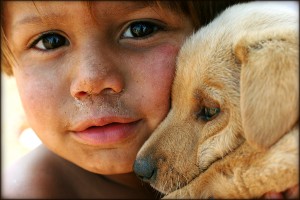Pet Death
Children and Pet Loss
Question:
Our family dog died last week and my son is beside himself. We held a small funeral for Scruffy and then had him cremated. Should I be worried about my son’s grief and loss?
Pet loss, and the stages of grief related to it, is just now coming into sharp focus. Researchers are beginning to contrast how the loss of a pet can affect a person with the loss of a relative or a friend. In 2006, the Journal of Death Studies (Volume 30: pages 61-76) did an article about children and coping with the loss of a pet.
Here is some information from the article which might be of help to you:
1. Depression and anxiety might occur over the loss of a pet but it probably won’t be as intense as the loss of a family member.
2. Some research has found up to 30% of children experience severe grief. What children might experience more grief then others is determined by how integral the pet was to the family, how strong the tie was to the pet, and if the death was sudden.
3. Adolescent girls have a harder time with pet loss than do boys in that age group.
For children, grief over a pet might last longer than for adults. It might be the child’s first time experiencing death and hence they may show more emotions as they learn what grief feels like and what it means to them.
4. A death of a pet can bring up grief from past losses. (If a pet was brought into the family before the loss of a loved one that pet is like a bridge to that person. When the pet dies people have said it brings back the loss of the loved one all over again. People state if feels like they have lost the last living link to their loved one lost.)
With your son, be aware that his grief might be very intense. His relationship to Scruffy was one that he had every day. Do not be surprised if his grief is more intense over the loss of his pet than if a grandparent dies that he has not seen very often. Children grieve differently than adults. Some warning signs of intense grief are: not wanting to go to school, wanting to go to heaven to be with Scruffy, and problems with eating and sleeping. You might see some acting-out behaviors because your son doesn’t know how to talk about his anger or sadness over the loss of his pet.
There are things you can do to help your son heal. They are:
1. Do not downplay your son’s grief over the loss of his dog. To him the loss is deep, personal, and hurts like heck. In other words, do not trivialize his feelings.
2. Talk to him about his feelings. If he has troubles verbalizing his thoughts then have him draw pictures of him and Scruffy. Then have him talk about the pictures.
3. Creating pet memorials for Scruffy either through clay, paintings, a poem, writing, or any other form of memorial services.
4. Talk about grief and feelings and explain that getting a new pet right away won’t make the sad feelings go away. Tell him that in time if it is right for him and the family a new dog will be brought into your home.
5. Let him know that you understand that a new pet will never be a replacement for the old. Help him to see that a new pet will bring new yet different delights.
Pet loss is a wonderful way for kids to learn about loss and the subsequent grief. The way you help them to handle their emotions and questions during this loss will set the stage for future losses amongst friends and family members. Don’t avoid the subject but address it head on.
© 2010 Kelasan, Inc.





